A family's newfound resolve is tested — again: Swimming Upstream
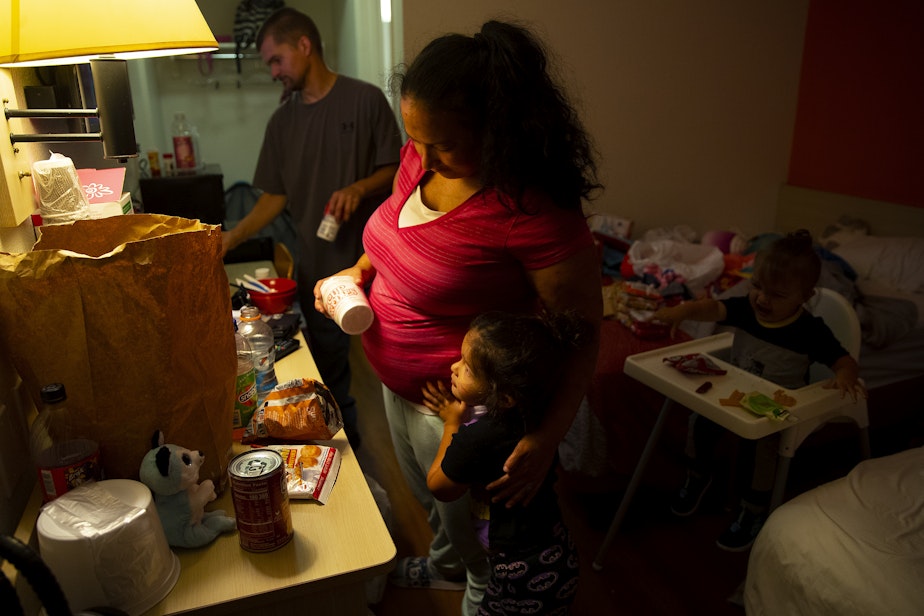
Following a major setback, a family’s will to keep up life-saving routines is put to the test.
This is Part 3 of KUOW's three-part series, "Swimming Upstream." This collection of stories details the mental health-focused journey of one Seattle-area family through crisis. KUOW is not using the shared last name of the father and children, to protect the children's identities.
T
hree weeks before 5-year-old Vay’s first day of kindergarten, her family will be tested — again.
She, her 2-year-old brother Messiah, and her parents, Tynikki and Sean are in the midst of rebuilding their family, after both parents sank into a drug addiction that left Vay separated from them for nearly two years. They're now finding new stability through a voluntary, three-year home visitation program for pregnant and parenting women with substance use disorders.
Soon after midnight on a warm August night, a fire lit up the Lynnwood apartment complex where they’ve lived for the past year. Sean was the first to spot the fire, just as he walked outside for a final cigarette before bed. He called 911 as he and Tynikki raced around banging on doors to wake up neighbors.
Sponsored
Their next call was to Ashley, the on-site manager for this transitional housing complex, with 24 units where most residents are also working toward stability after homelessness or drug addiction.
The third call was to Toni Gardner, their ongoing case manager in the home visitation program, who was out of her house in minutes.
“We have to start over,” Tynikki says over the phone the next day, her voice keyed up yet matter of fact. “I’m overwhelmed. All our food, gone. Our vouchers, gone.”
Tynikki recounts the previous night, still hardly processing it just a few hours later. “We got all those kids out. We put four or five kids in our car to get them to the hotel.”
All of the residents got out safely but several units were damaged beyond use. The flames didn’t reach Tynikki and Sean’s apartment, but there’s smoke and water damage they’ll need to fix.
Sponsored
Through the day, TV news cameras set up in front of the charred building.
Tynikki says people keep calling them heroes for sounding the alarm. She laughs at that idea — it’s so opposite from how she and Sean were viewed while living on the street two years ago, with their home in a shopping cart.
She spins through a cycle of scattered thoughts about what will happen to them next, her fear growing as she pictures the burning building, and stress mounting about the many extra hassles this displacement will surely bring. It’s a fair bit of rug pulled out from under this family that sees safety in routines, and risk when they are in limbo. Vay is shaken, too.
“She keeps asking, ‘Are we safe, are we ok from the fire?’” Tynikki says with a heaviness in her voice.
Swimming Upstream: a three-part series
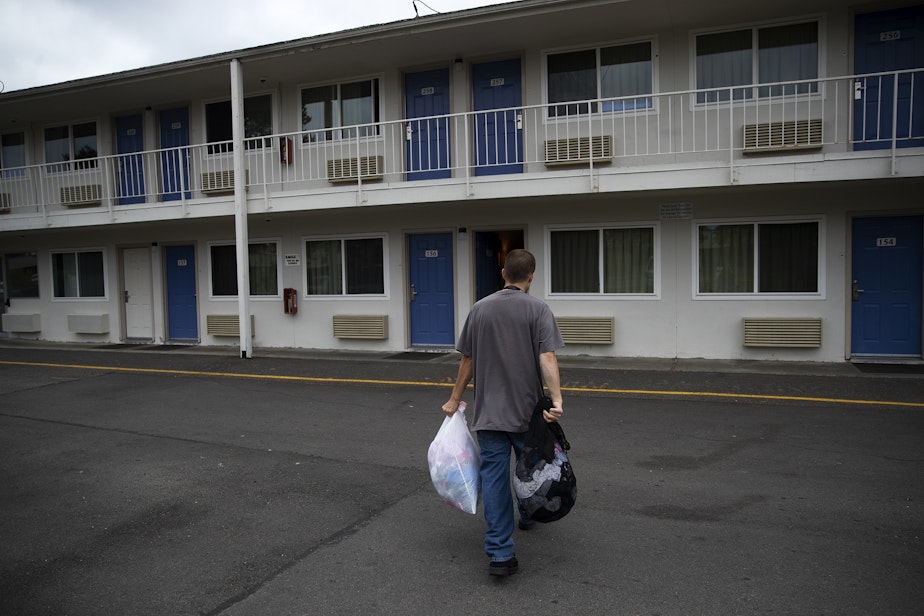
Thankfully, both kids can still spend their final summer days at daycare, with familiar friends and toys.
The hotel stay drags on while they wait to see if they can move back home, and the close quarters wear on all of them.
On a Thursday, about a week after the fire, Tynikki makes another microwave dinner for the kids: SpaghettiOs. She loves to cook and misses their usual theme night for family dinners: Hamburger Monday, Taco Tuesday, Breakfast Wednesday, Thursday Leftovers, and Fun Friday. In the background, Vay playfully, repeatedly shouts for her mom’s attention — she wants to go swimming at the hotel’s outdoor pool. Messiah fusses that he’s done with dinner.
Sponsored
Tynikki makes a power move, taking a time out for herself in the only quiet space: the hotel bathroom. “This is the thing that Toni wants me to start practicing with her — as I leave the room, then see what she’s going to do,” Tynikki says.
In that chaotic moment, Tynikki is pulling out an exercise from a weekly parenting course she's working through with her case manager Toni Gardner. Stepping out of the room is a way to build up Vay’s trust that she can do more on her own, and know that mom will be there when she needs her. But the timeout only lasts a few minutes before Tynikki returns to help calm Messiah’s cries.
“S
o right now my mental state is at a two and it should be more of a five to six or above,” Tynikki says a few days later, still at the hotel. “Right now, I'm not okay.”
Sponsored
She’s having nightmares about the apartment fire, which local authorities have determined was likely arson. She just had her weekly call with a mental health counselor she likes, who encouraged her to keep up her self-care. But more than anything, Tynikki’s worried about Vay. She’s pained to see her daughter revert to some of the same fears and questions she had a year ago, when they first reunited.
“She keeps waking up asking me, 'Are you gonna be okay, Mom? Are you gonna pick me up?' She was so confident before the fire that she didn't even have to ask us if we're gonna pick her up. And now she's re-asking.”
RELATED: For moms in recovery, these home visitors offer a lifeline
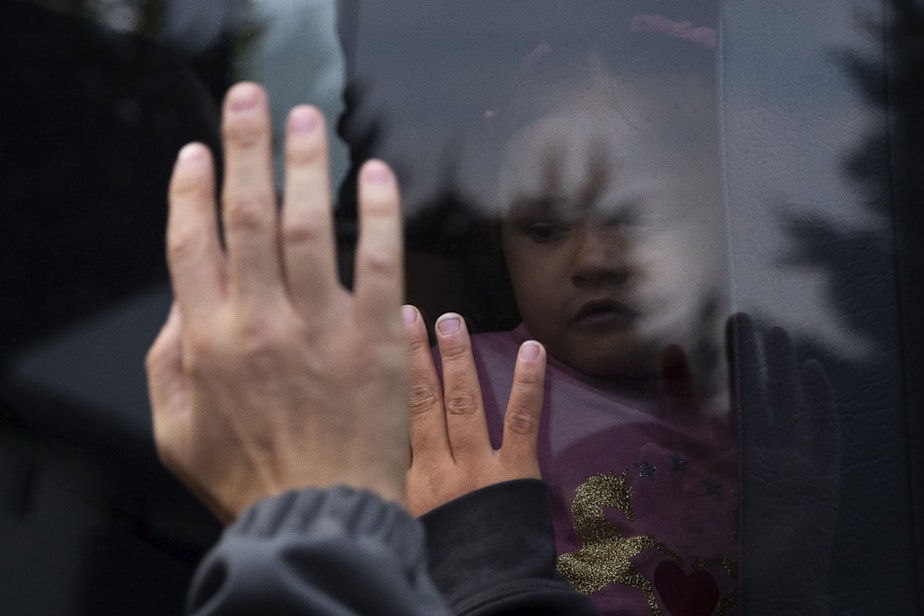
Tynikki puts her finger squarely on Vay’s need: reassurance. They’ve been here before. She determines to be “stronger and more powerful-minded than usual” and to try to make this time fun for her kids. Vay’s small voice pipes up in the background, “Mommy, I want to go to the store right now.” It’s a frequent request. Tynikki, upbeat, engages her daughter in a plan for the day. She coaches her to go get dressed, brush her teeth, and wash her face.
“We'll go to daycare, we’ll pick you up and then we'll go shopping with your Barbie. Does that sound like a plan?”
Vay pushes to hear the plan one more time, then she lets out a hearty giggle and wanders off to her chores.
Kindergarten starts next week for Vay. The bus will pick up outside her apartment, although it’s still uncertain if they’ll be back home by then.
For any family, physical and mental health are key pieces of a stable foundation. Through these past two years, Tynikki and Sean have faced a steep learning curve to understand their own health complications, those of their kids, and how to manage it all as a family.
Their awareness of their family’s unique health risks and needs still hovers on the surface of their lives, like a television that’s always on. But, in time, the volume seems to be coming down.
RELATED: Reporter's notebook: tending to childhood scars in a pandemic, both old and new
Gardner, their case manager, has helped clear a lot of health barriers for this family, from strategies to stay on track with drug treatment, to getting them set up with ongoing care for various medical issues. Tynikki and Vay both meet weekly with a mental health counselor. Sean is steadily weaning off of Suboxone, a medication used to treat opioid addiction. For Gardner, after nearly two years with Tynikki’s family, she sees the time has come for her to step back.
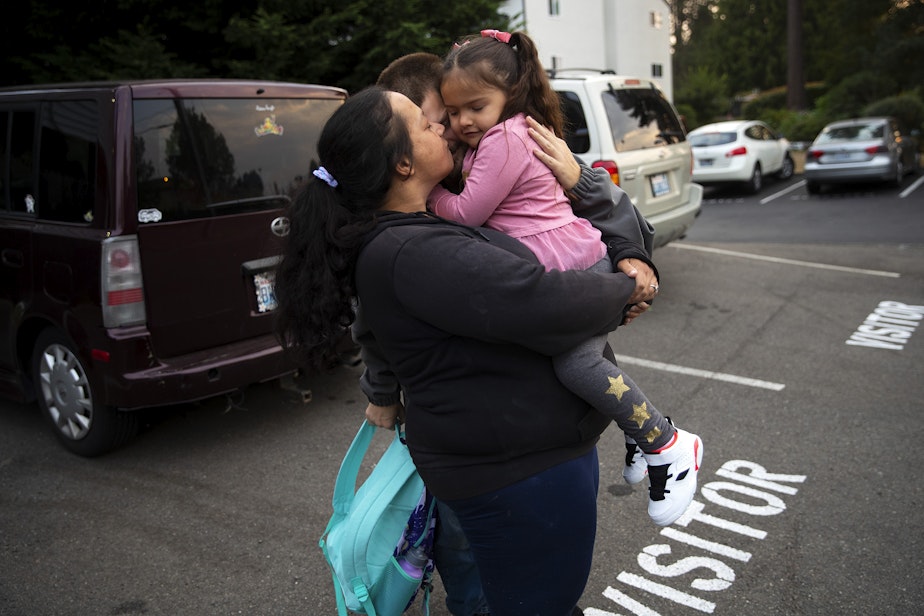
‘Ready to fly’
On Vay’s first day of kindergarten, it’s all glitter and unicorns, from pink shirt to purple backpack. As they wait for the bus together, Tynikki pulls in Sean and Vay for a family huddle and a pep talk they all know by heart: “We are strong, we are brave, we are independent, we are smart — and we got this.”
Vay steps onto the yellow bus like a rock star, then from her window seat she sees her dad press up his hands into a heart shape. Her little fingers mirror his gesture. Her first school days start extra early, with a 6 a.m. wake up, since they’re still making a half hour drive from a hotel in Everett to catch the 7:40 school bus outside their apartment.
A month later, in mid-October, Gardner stops in for a visit while the kids are off at school. She takes a seat on the couch, admiring a toddler-size elephant suit laid out for Messiah's Halloween costume. Vay will go as a “Unicorn Princess.”
The family appears comfortably settled into a new school routine, back again in their apartment. Vay returns from school exhausted and hungry for dinner, then often sacked out well before her 8 p.m. bedtime. Gardner asks about other changes Tynikki has noticed since Vay started school. “She's more talkative about her day,” Tynikki says. “Like she'll explain to me what she did throughout the day. She'll give me three subjects that she did…like, ‘I did shapes today’, or ‘I played at recess.’”
Tynikki and Vay’s teacher use a notebook to pass comments back and forth about school, and in a recent one, the teacher gave her an ‘Outstanding Student Award’ and praised Vay for being great with safety, responsible, and friendly.
“I noticed she’s been a lot calmer, and you’ve been a lot calmer, too,” Gardner says. Tynikki agrees, and for her part, she says it’s helped to cut back on communication with some family members who cause her stress.
Today is Gardner’s last home visit as Tynikki’s lead case manager. Gardner has a waitlist of moms who are at the point where Tynikki was two years ago, needing more intensive support. So a newly hired case manager will take over for Tynikki’s third and final year in this home visiting program, and Gardner jokes that Tynikki can help show her the ropes.
On this visit, they watch one last home recording in the 10-week parenting course, “Promoting First Relationships,” which Gardner doled out a little more gradually with Vay and Tynikki through the past six months.
The video captures the same general trust exercise Tynikki tried with her timeout in the hotel bathroom, when she stepped out of the room. In the video, Tynikki bends down next to Vay and tells her she’s leaving for a few minutes “I want you to stay here and play with these toys,” Tynikki says. “I’ll be right back, ok?”
Once she’s gone, Vay stalls and looks around for a few seconds, then pulls a puzzle off the shelf and gets busy.
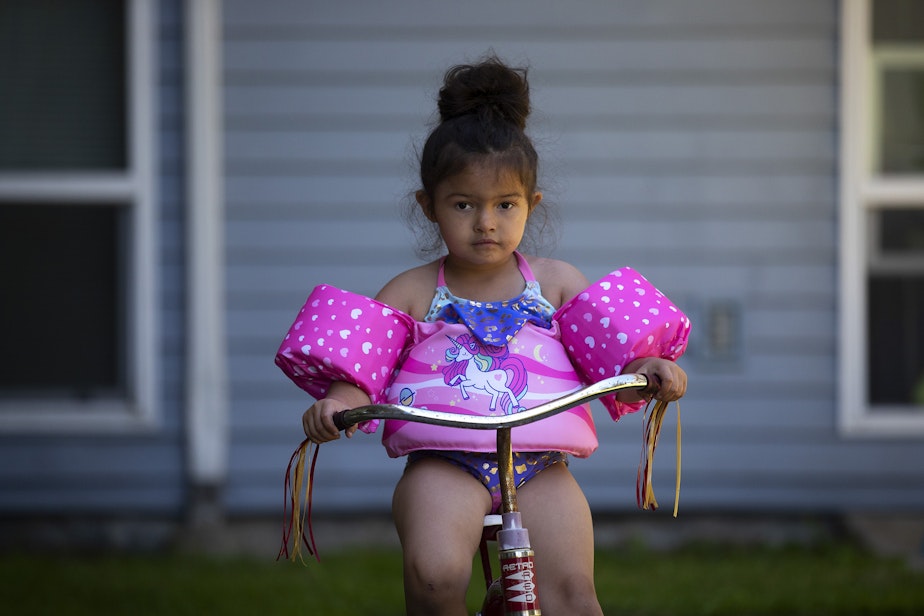
When Tynikki peeks back in a few minutes later, Vay jumps up and races to her.
“What was that like for you, watching that?” Gardner asks.
Tynikki's impressed that Vay stayed focused on the toys, but her real takeaway came at the end. “How excited she was to see me after,” Tynikki reflects, still looking at the paused screen.
Gardner reminds Tynikki of the difference from a year ago, when Vay came back to live with her.
“And you were like, ‘Oh my gosh, how do I connect to this little girl? I love her so much. How do I connect?’” Gardner recalls. “You’ve really, really grown a lot.”
Tynikki sees it, too. “I feel good and more confident because I can talk to her,” Tynikki says. “And if we're not having an agreement, we can actually sit down and explain the situation better to her.”
Both women have seen Vay’s attitude change this past year. She responds more calmly to choices her parents give her, and she’s (mostly) stopped running off or hitting when she doesn’t get her way.
Gardner hands Tynikki her certificate from the parenting course, and Tynikki says it’ll go up on the fridge, where she also keeps the course worksheets for easy reference.
Tynikki’s been on a health kick lately, juicing and making fresh smoothies for her and the kids.
The apartment smells of lemon cleaner from her “workout” earlier, mopping the living room floor and working in squats as she crosses the room. She does that for herself, and for the kids.
“Oh, they’re happy every time they come home to a clean house,” she says.
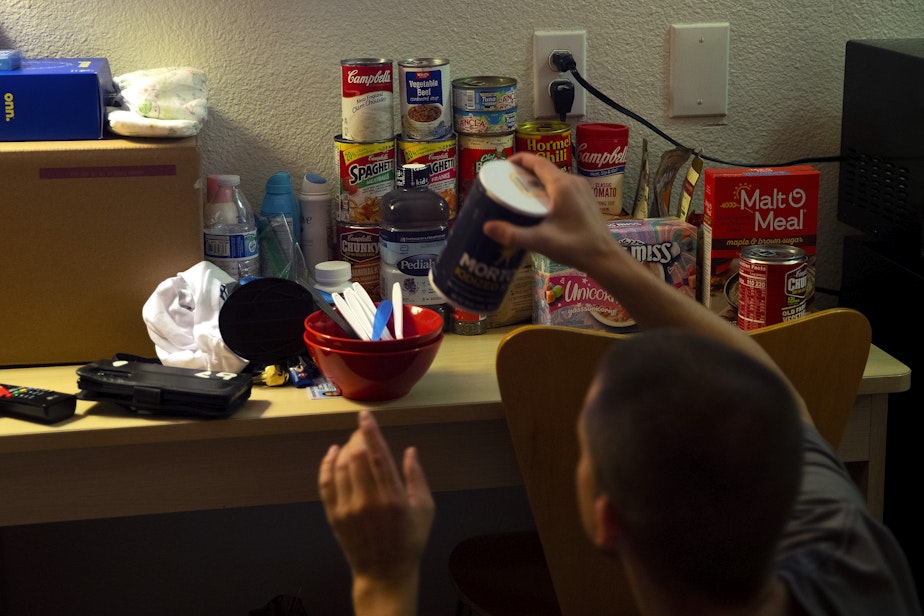
For Tynikki and Sean, a next big goal is to get jobs. They get by right now mostly on government assistance. Sean hopes to get a certificate soon to be a flagger on road projects. Tynikki's long-term aim is to become a peer mentor to other moms or teens in active addiction, giving back the kind of support her team gave to her.
The next official step for them in the three-year Parent-Child Assistance Program program is to move from transitional housing to a permanent home. They’ve qualified for low-income housing through the Snohomish County Housing Authority and expect to receive their voucher in January, giving them three months to find a place before it expires. Competition is fierce for low-income housing, especially if they want to stay fairly close to the kids’ schools.
Tynikki keeps a picture in her mind that carries her past the next series of steps on her journey — past the job hunting, the housing, the doctor visits, and the ongoing resolve to stay clean.
“I just see me and Sean growing old, and seeing my kids grow old and having their own children, and just living the best life that I can for me and my kids,” she says.
Gardner has just stepped back into the room, after getting two emergency calls about her clients. One mom is refusing to go into treatment and another is dealing with a police matter. On other days, Gardner’s been called away when a mom has overdosed or died.
Those days break her a little, but it’s days like this one with Tynikki that keep her going — the days she sees her moms “are ready to fly.”
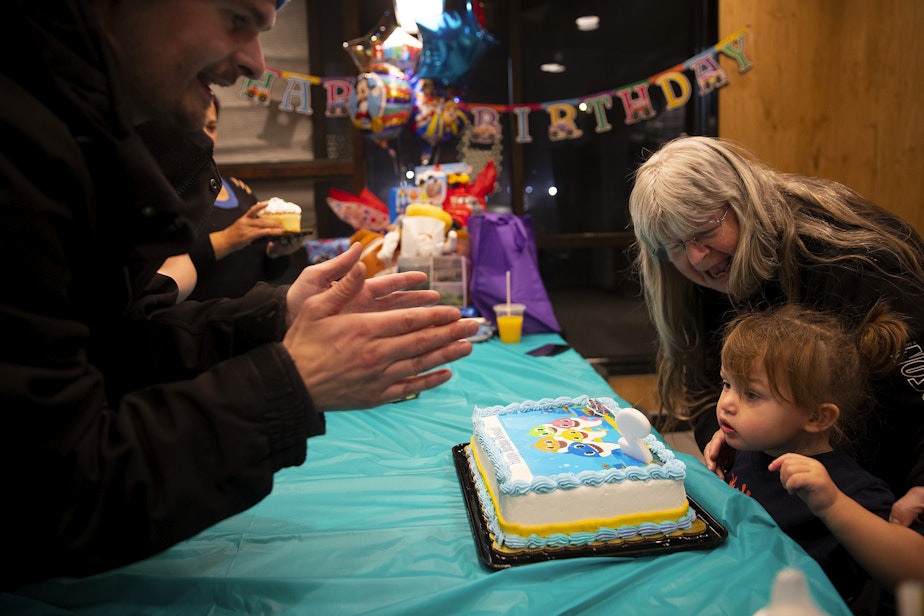
“That’s beautiful,” she responds to the picture Tynikki described. “Because it's just, you know, the generational change from what your generations have done so far.”
“I picture it all the time,” Tynikki says. “I can see me and Sean rocking, like on the old school rockers. I can see my daughter actually coming up to me and asking questions. If she needs my help, I'll be there. These kids are my everything.”
Liz Jones is a 2021-22 fellow with the Rosalynn Carter Fellowships for Mental Health Journalism. This story is part of a project focused on solutions for childhood adversity and trauma connected to the Covid-19 pandemic. If you have a story you’d like to share, please email her at ljones@kuow.org.




